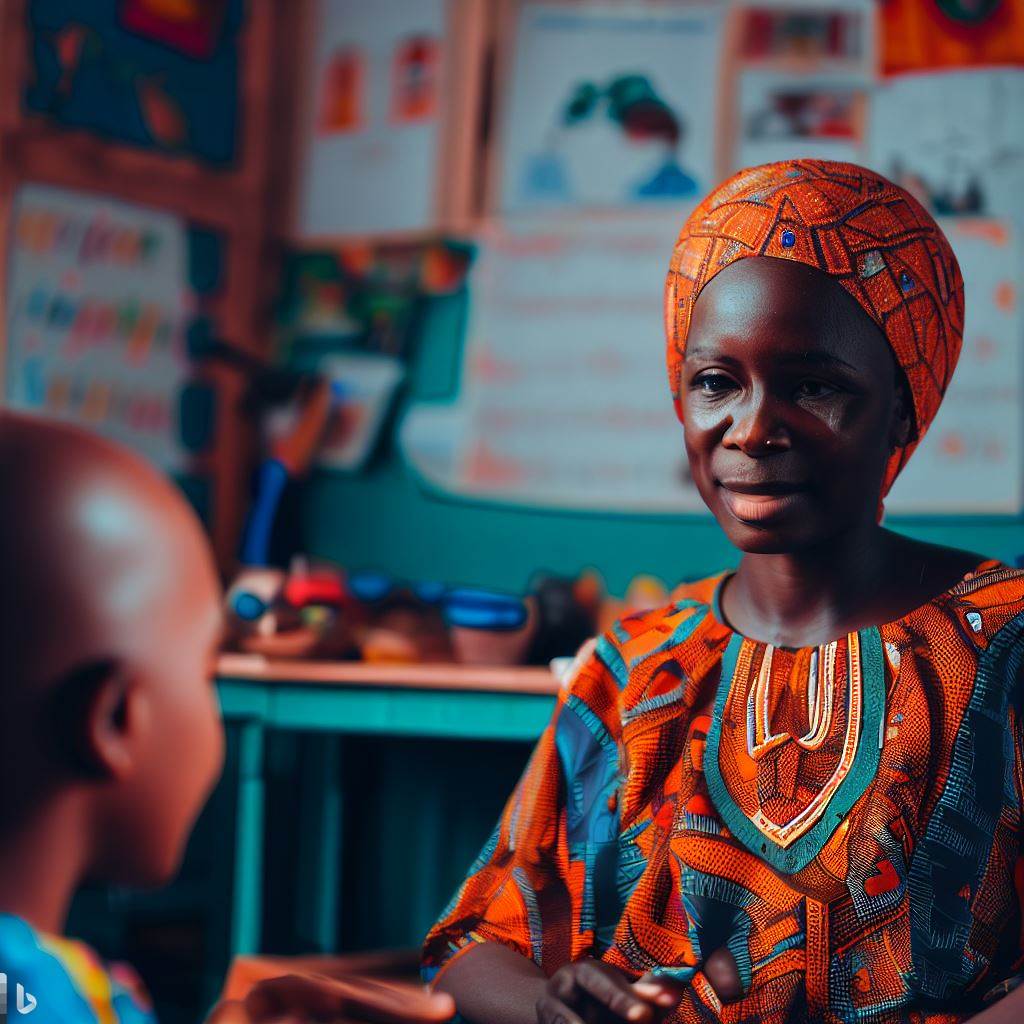Introduction
A. Definition of Special Education
Special education serves students with disabilities, tailoring teaching methods to their unique learning needs.
B. Importance of Special Education Legislation and Policies in Nigeria
- Equity: Ensures equal educational opportunities for all, regardless of disabilities.
- Inclusion: Integrates students with disabilities into mainstream classrooms, fostering diversity.
- Empowerment: Enables students to reach their potential, contributing meaningfully to society.
- Human Rights: Upholds the rights of every child to quality education, as per international agreements.
- National Development: Nurtures diverse talents, boosting workforce productivity and innovation.
C. Purpose of the Blog Post
This blog post aims to shed light on Nigeria’s special education legislation and policies, recognizing their significance in fostering an inclusive and empowered society.
Historical Overview of Special Education in Nigeria
Early establishment of special schools
During the colonial era in Nigeria, special schools were established to cater to the educational needs of individuals with disabilities. These schools were mainly influenced by the British educational system.
Evolution of policies and legislation for special education
The Education for All Handicapped Children Act (EFAHCA) in 1979
In 1979, Nigeria passed the Education for All Handicapped Children Act (EFAHCA), which aimed to provide free and appropriate education for children with disabilities.
This legislation marked a significant milestone in the development of special education in Nigeria.
National Policy on Education (NPE) in 1981
In 1981, Nigeria implemented the National Policy on Education (NPE), which laid out the guidelines and principles for the provision of education for all individuals, including those with disabilities.
This policy emphasized the inclusion of special needs students in mainstream schools.
Education (National Minimum Standards and Establishment of Institutions) Act in 2004
In 2004, Nigeria enacted the Education (National Minimum Standards and Establishment of Institutions) Act.
This legislation aimed to ensure that all educational institutions meet minimum standards and provide inclusive education for students with disabilities.
With the introduction of these policies and legislation, the landscape of special education in Nigeria underwent significant changes.
The focus shifted from segregating individuals with disabilities to promoting their inclusion and equal access to education.
In the end, the historical overview of special education in Nigeria reveals a gradual shift towards inclusivity and equal opportunities for individuals with disabilities.
Colonial-era practices shaped early special schools, but Nigeria advanced through inclusive education policies and legislation, ensuring quality education access.
However, there is still much work to be done to fully achieve inclusive education for individuals with disabilities in Nigeria.
Read: Opportunities for Special Education Teachers in Nigeria
Transform Your Career in Nigeria
Discover unmatched expertise with our personalized Career Consulting service. Navigate Nigeria’s job market with a strategy tailored just for you.
Get StartedCurrent Special Education Legislation and Policies in Nigeria
The Nigerian government has made significant efforts in implementing special education legislation and policies to ensure equal opportunities for persons with disabilities.
Here, we’ll review Nigeria’s current laws. This includes the 2018 Disabilities Act, 2004 Education Policy, and state-level rules.
The Discrimination against Persons with Disabilities (Prohibition) Act (2018)
The Discrimination against Persons with Disabilities (Prohibition) Act (2018) is a crucial legislation that aims to protect the rights of individuals with disabilities.
The act prohibits any form of discrimination based on disability and provides equal opportunities for this marginalized group.
It includes key provisions such as ensuring access to public buildings, transportation, and employment opportunities for persons with disabilities.
This act has had a positive impact on special education by promoting inclusive practices and creating a more inclusive society.
Read: A Comprehensive Overview of Special Education in Nigeria
National Policy on Education (NPE) (Revised 2004)
The National Policy on Education (NPE) (Revised 2004) is another significant policy that addresses the educational needs of students with disabilities.
It emphasizes inclusive education by promoting equal access to education for all individuals, irrespective of their disabilities.
NPE acknowledges inclusive education: provides services, adapts curriculum, supplies assistive tech for disabled students in regular schools.
However, the implementation of these provisions faces challenges and gaps, including limited resources, inadequate training for educators, and insufficient accessibility measures in schools.
Highlights of state-level special education policies
State-level special education policies also play a crucial role in ensuring inclusive education for individuals with disabilities.
Lagos State Special Education Policy (2012) emphasizes the provision of inclusive education within mainstream schools and the establishment of special education centers.
Enugu State Policy on Special Education (2015) focuses on the integration of students with disabilities into mainstream schools, ensuring access to quality education and specialized support services.
The 2019 Kano State Education Policy for Children with Special Needs strives for equitable education via inclusion, teacher training, and focused interventions.
In fact, Nigeria has made significant strides in special education legislation and policies.
The 2018 Act bans disability discrimination while the 2004 Revised NPE crucially drives inclusivity and equal opportunities for disabled individuals.
The Lagos State Special Education Policy (2012), Enugu State Policy (2015), and Kano State Policy (2019) promote inclusive education.
Improving strategies, allocating more resources vital for effectively enabling inclusive education access for individuals with disabilities.
Read: The Role of a Special Education Teacher in Nigeria
Delve into the Subject: Role of Health Educators in Addressing Nigeria’s Health Crises
Benefits and Challenges of Special Education Legislation and Policies in Nigeria
Benefits
- Access to quality education for students with disabilities: Special education legislation and policies ensure that students with disabilities have equal access to education, which promotes their learning and development.
- Protection of rights and inclusion: These laws and policies protect the rights of students with disabilities and promote their inclusion in mainstream educational settings, fostering a sense of belonging and equality.
- Promotion of equal opportunities: Special education legislation and policies aim to provide equal opportunities for students with disabilities, allowing them to reach their full potential and participate in society on an equal footing.
Challenges
- Limited funding and resources: One major challenge is the inadequate funding and limited availability of resources for special education programs, hindering the implementation of inclusive practices and support services.
- Lack of awareness and implementation gaps: Many people, including educators and parents, lack awareness and understanding of special education laws and policies, leading to gaps in their implementation and ineffective support for students with disabilities.
- Teacher training and capacity building issues: Teachers often lack the necessary training and skills to effectively support and teach students with disabilities, posing a significant challenge to the successful implementation of special education legislation and policies.
Special education laws in Nigeria grant quality education, protect rights, and offer equal chances to disabled students.
Addressing challenges like limited funds, awareness gaps, and inadequate teacher training is essential for effective law implementation.
Addressing challenges, Nigeria can foster inclusive education, empowering disabled students to thrive and enrich society.
Publish Your Professional Profile, Business or Brand
Showcase your expertise, gain trust, and boost visibility instantly on Professions.ng.
Publish NowRead: Understanding the Nigerian Special Education Curriculum

Promoting a More Inclusive Future: Recommendations and Initiatives
In order to promote a more inclusive future for special education in Nigeria, it is crucial to implement a series of recommendations and initiatives.
These strategies aim to strengthen legislation, enhance implementation efforts, and raise awareness and change societal attitudes towards individuals with disabilities.
Strengthening special education legislation
One key recommendation is to strengthen special education legislation through revisions and amendments.
By regularly updating and improving existing laws, Nigeria can ensure that they remain relevant and effective in addressing the evolving needs of students with disabilities.
It is essential to stay up-to-date with best practices and trends in inclusive education to provide the most appropriate support for learners.
Additionally, aligning Nigerian special education legislation with international standards is of utmost importance.
By meeting global guidelines for inclusive education, Nigeria can ensure that its policies and practices are in line with the best available expertise and research.
This alignment will contribute to creating a more inclusive and equitable educational system for students with disabilities.
Enhancing implementation strategies
It is equally important to focus on enhancing implementation strategies.
Collaboration between the government, non-governmental organizations (NGOs), and other stakeholders is crucial for effective implementation.
By working together, these entities can pool resources, share knowledge, and coordinate efforts to provide the best possible education and support for students with disabilities.
Furthermore, investing in infrastructure and resources is vital for the successful implementation of inclusive education in Nigeria.
Adequate funding should be allocated to provide necessary facilities, materials, and resources that can accommodate the diverse needs of students with disabilities.
This investment will create an enabling environment that promotes equal participation and access to educational opportunities.
Read: Insights into the Teaching Profession in Nigeria Today
Raising awareness and changing societal attitudes
Raising awareness and changing societal attitudes is another significant aspect of promoting a more inclusive future.
Sensitization campaigns and community engagement initiatives can educate the public about the rights and needs of children with disabilities.
By fostering understanding and empathy, these campaigns can help combat stigma, discrimination, and misconceptions surrounding disability.
Empowering parents and support groups is also crucial in creating an inclusive future.
By providing information, resources, and support networks, parents can better advocate for their children’s rights and access to inclusive education.
Support groups can offer a platform for sharing experiences, providing emotional support, and exchanging knowledge, ultimately strengthening the collective voice for inclusive education.
In short, promoting a more inclusive future for special education in Nigeria requires a comprehensive approach.
It involves strengthening legislation through revisions and aligning it with international standards. Effective implementation strategies should prioritize collaboration and investment in infrastructure and resources.
Additionally, raising awareness and empowering parents and support groups are essential for changing societal attitudes towards disabilities.
By implementing these recommendations and initiatives, Nigeria can create a more inclusive education system that ensures equal opportunities for all students, regardless of their abilities.
Read: The Challenges and Triumphs of Special Ed Teachers in Nigeria
Conclusion
Special education legislation and policies play a crucial role in ensuring that children with disabilities in Nigeria receive proper education and support.
These measures promote inclusivity, equality, and access to educational opportunities for all students.
The progress made in special education legislation and policies in Nigeria should be celebrated. However, it is essential to acknowledge that there is still much work to be done.
Continued efforts towards inclusivity and equal rights for children with disabilities should be prioritized.
The future prospects of special education in Nigeria are promising, given the commitment shown towards enforcing inclusive policies and legislation.
With a collective effort from the government, educational institutions, and society as a whole, the barriers faced by children with disabilities can be further dismantled.
It is crucial to ensure adequate funding and resources for specialized educational programs and to provide ongoing support for teachers and students.
Special education legislation and policies in Nigeria are essential for guaranteeing a quality education for children with disabilities.
The progress made so far is commendable, but there is still a need for continuous efforts towards inclusivity and equal opportunities.
By working together, Nigeria can create a future where every child, regardless of their abilities, has access to a quality education and can reach their full potential.




